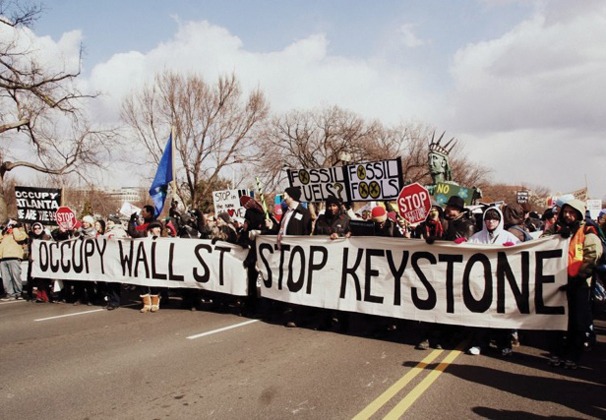by Eleanor Finley, ISE board member
At Least for a Day: The Fight Against Tar Sands Oil Unites Indigenous Activists, Occupiers, and Big Environmental NGOs

On Sunday, February 17th, nearly 50,000 people ventured out into the icy morning to gather at the Washington Monument in Washington, DC. There, braced against the biting February wind, the Forward on Climate Rally swelled into the largest climate march in history.
The focal point of the rally was to challenge President Obama to reject a proposal by the multinational corporation TransCanada to transport tar sands oil across the U.S through their under-construction Keystone XL pipeline. According to TransCanada’s claims, the project will contribute another tenth of 1 percent of the world’s total carbon emissions. However, these figures do not account for emissions generated when refining the oil, transporting the oil, or future exploitation of tar sands oil reserves.* In his State of the Union address, the president voiced support for serious action to climate change, but significant federal action toward this goal is yet to be seen.
Officially, the rally was lead by the Sierra Club and the 350.org campaign. However, organizations and individual participants present on the ground gathered from a diversity of backgrounds from across the United States and Canada. Just a few of the radical movements and organizations present in DC last weekend were Idle No More, Occupy Sandy, and the Tar Sands Blockade.
Perhaps unsurprisingly, there was no prevailing consensus at the rally concerning how to create an ecologically just society, or even what an ecologically just society might be. However, the tone of the event reflected a growing sense that the global climate crisis is inextricably bound with the problem of social oppression and inequality. At a large solidarity rally in San Fransisco lead by the Canadian indigenous rights movement, Idle No More, one activist summarized:
“It’s funny; the same things we need to do to stop climate change are the same things we need to do to stop poverty, austerity, and war.”
It’s true. The climate crisis can only be solved by the fundamental transformation of our social, political and economic systems to a directly democratic, free society. And while the old tensions between reformism and revolution linger, it’s still a thrill to see so many communities united on the streets of Washington DC, fighting for our future.
___________________________________________
* Climatologist James Hansen estimates that Alberta’s tar sands contain as much as 240 gigatons of carbon, enough to raise the atmospheric CO2 concentration by an additional 120 parts per million. The US Department of Energy says that mining and extracting oil from the tar sands releases 3 – 4.5 times as much carbon dioxide into the atmosphere as conventional oil extraction. Sources: James Hansen, “Game Over for the Climate,” New York Times, May 9, 2012; US Department of Energy data, cited in Nathan Lemphers, “The climate implications of the proposed Keystone XL oilsands pipeline” (Calgary: Pembina Institute, 2013). –Editor

